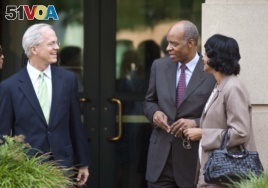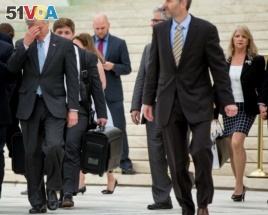04 February, 2017
A court in the state of Virginia is reviewing a legal case against a congressman who had $90,000 in his freezer.
Former U.S. Congressman William Jefferson has been in prison since 2012 after being found guilty of corruption. He is asking a federal court to overturn the guilty ruling against him.
After a jury found him guilty, a judge sentenced Jefferson to 13 years in prison. It was the longest prison sentence ever given to a member of Congress.
Jefferson is a Democrat who represented New Orleans, Louisiana in Congress.
He was found guilty of trying to influence leaders in Nigeria and other African nations to help an American business that provided his family with money and stock. The American business wanted to set up cable television, telephone and internet services in Africa.

Former Louisiana Rep. William Jefferson, center, accompanied by his wife Andrea, talks with his attorney Robert Trout
"Cold cash' in food boxes
The case received a lot of attention in Nigeria. One reason was that $90,000 in $100 bills was found in food boxes in a freezer in the congressman's Washington D.C. apartment. The case became the subject of jokes on American and Nigerian television. Television hosts called the money, "cold cash," or "cold money."
During the trial, the government said Jefferson was recorded saying he needed money to persuade Nigeria's vice president, Atiku Abubakar, to approve the American company's business deals.
Asked if he delivered the money during a secretly recorded discussion, Jefferson said he had given the "African art" to the Nigerian vice president. The government said those words were "code" for cash.
But Jefferson and his wife, Andrea, later wrote that they never were asked and never gave money to any government official.
During his trial, the government played a video of Jefferson accepting a briefcase that the government said was filled with $100,000 in $100 bills. It was that money -- missing $10,000 -- which was found in Jefferson's freezer, the government argued.
John Campbell is a former United States ambassador to Nigeria. Campbell said the case received "attention" in Nigeria because it had so many unusual details and Abubakar was a senior government official.
Abubakar twice ran unsuccessfully for president and is reported to be a possible presidential candidate in the next Nigerian national elections.
Why the case did not get more attention
Campbell said the case might have gotten even more attention if corruption was not common in Nigeria.
Now, Jefferson is appealing the guilty ruling, which he wants overturned. His lawyers argue that the U.S. Supreme Court last year redefined how corruption cases should be decided.
In 2016, the Supreme Court overturned the guilty ruling against former Virginia Governor Robert McDonnell.
McDonnell and his wife were found guilty of corruption in 2014. The government charged that McDonnell received an expensive watch and his wife was given a shopping spree, among other gifts, from the owner of a Virginia business.
But the U.S. Supreme Court said the jury in the McDonnell case was given a definition of official acts that went too far. The definition, it said, would make government leaders worry about scheduling needed meetings out of fear of facing criminal charges. The court said there was testimony that McDonnell set up meetings for the Virginia businessman, but none that he provided direct benefits in return for the gifts.

Former Virginia Gov. Bob McDonnell, left, with his wife Maureen McDonnell, right, leave the Supreme Court last year.
During his 2009 trial, Jefferson's lawyer Robert Trout argued that Jefferson's actions of trying to get African officials to grant business to an American company were not part of his official duties. A congressman's job, Trout said, is to vote on bills, introduce bills, and attend committee meetings.
Trout said the trial judge, T.S. Ellis III, gave the jury a definition of official acts that was too broad.
Federal officials who brought the case said the guilty ruling against Jefferson should remain.
Ellis will decide what to do with Jefferson's appeal.
Jefferson is serving his 13-year sentence in a prison in Louisiana. He is to be released on August 30, 2023, when he would be 76 years old.
I'm Bruce Alpert.
Bruce Alpert reported on this story for VOA Learning English. Mario Ritter was the editor.
We want to hear from you. Write to us in the Comments Section and share your views on 51VOA.COM.
__________________________________________________________
Words in This Story
stock - n. a share of the value of a company which can be bought, sold, or traded as an investment
cable television - n. a system in which television signals are sent through cables rather than through the air
host - n. a person who is entertaining guests socially or at a club or on television
briefcase - n. a flat case that is usually used for carrying papers or books
shopping spree - a phrase meaning to do a lot of shopping over a short period of time
watch - n. a device that shows what time it is and that you wear on your wrist
testimony - n. statement made under oath in court
broad - adj. wide in range or amount